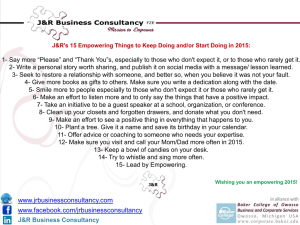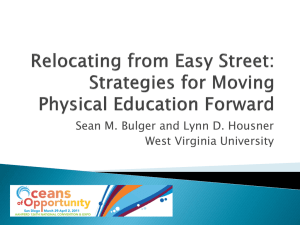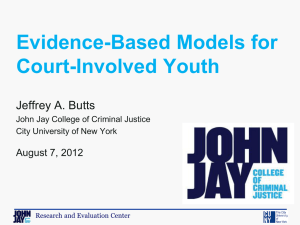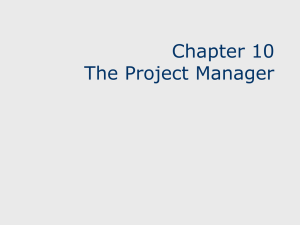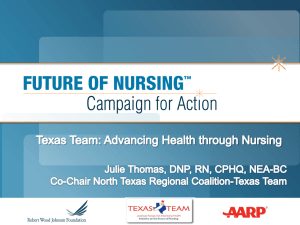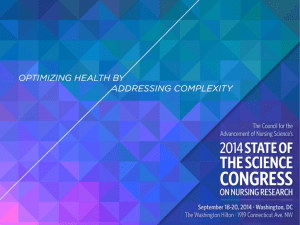Teaching EBP in an Online Setting
advertisement
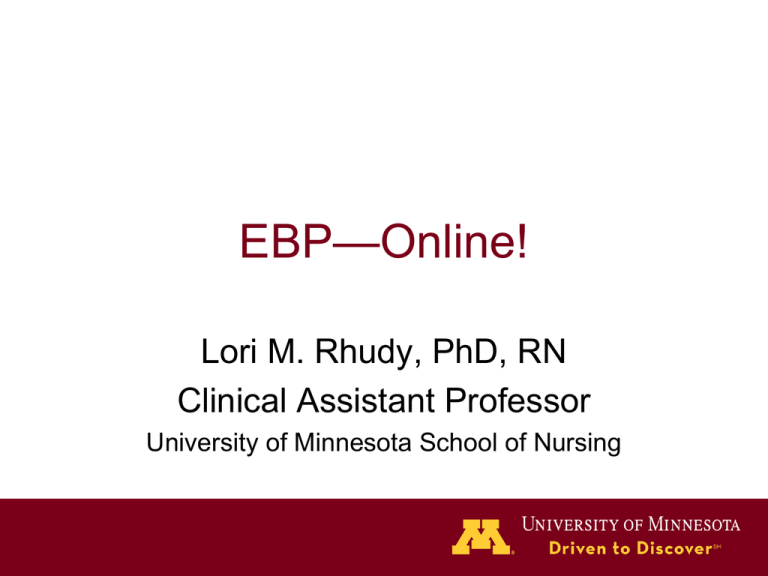
EBP—Online! Lori M. Rhudy, PhD, RN Clinical Assistant Professor University of Minnesota School of Nursing Best Practices in Online Teaching a nationally recognized, facultycentered, peer review process designed to certify the quality of online courses and online components. https://www.qualitymatters.org/higher-education-program http://digitalcampus.umn.edu/faculty/qm/ Empowering Evidence 2014 Pedagogy of Online Practices—Content • Chunking your course to sizable content • Relate course goals into one or more measurable Learning Objectives for each unit/module/week of your course • Use a Course Orientation Module or Getting Started Module as an orientation to your online course • Use mobile apps to encourage student-created course content • Use problems to anchor course content to real life discipline practices Empowering Evidence 2014 Pedagogy of Online Practices—Interaction • Setting Discussion Expectations to support students • Facilitate discussions to promote interaction and critical thinking • Use Group Discussion Strategy to facilitate group work • Use Anchored instruction to link student learning to real world issues • Use Problem-Based Learning to develop students' course related skills • Use wikis to facilitate group projects • Use mobile devices for experiential learning in applicable disciplines • Using mobile apps to facilitate project-based learning Empowering Evidence 2014 Pedagogy of Online Learning—Assessment • Group Evaluation to assess group work • Rubrics to evaluate students' online discussions • Self Tests to guide and motivate students' learning • Syllabus Quiz to familiarize students with course policies and expectations Empowering Evidence 2014 One Exemplar: NUR6100 Evidence-Based Nursing • Course Objectives – 1. Articulate the components and processes of an evidence based nursing practice. – 2. Acquire mastery in the identification, acquisition, evaluation and synthesis of clinical evidence – 3. Develop basic knowledge of implementation science including translation of quality evidence into clinical practice for improved patient outcomes. Empowering Evidence 2014 Course Development Considerations • Focus – Individual practice – Specific clinical question – Application – Theory/Concepts Empowering Evidence 2014 Nur6100 • Foundation of EBP • EBP is not the research course – Models of EBP – ‘Other’ sources of evidence – Implementation science Empowering Evidence 2014 Course Description: Examination of evidence based nursing including types and levels of evidence and the science of implementing evidence to change practice and improve patient outcomes. Empowering Evidence 2014 Course Objectives: 1. Articulate the components and processes of an evidence based nursing practice. 2.Acquire mastery in the identification, acquisition, evaluation and synthesis of clinical evidence. 3.Develop basic knowledge of implementation science including translation of quality evidence into clinical practice for improved patient outcomes. Empowering Evidence 2014 Learning Activities and Assessments • • • • • • Debate Discussion Case study Scavenger Hunt Teach Back In-class group work/assignments Empowering Evidence 2014 Debate: Objectives This activity contributes to course objective 1 (Articulate the components and processes of an evidence based nursing practice) 1.Discuss divergent views of EBP. 2.Identify barriers and facilitators of EBP. 3.Describe criteria for evaluation of models for EBP 4.Describe how models of EBP fit with theoretical constructs important to nursing. Empowering Evidence 2014 Debate: Learning Activities 1. Consider this resolution that you will debate: Comprehensive models of evidence-based practice are congruent with the theoretical constructs of nursing and do not force a cookbook approach to nursing care, which threatens our holistic paradigm. 2. Develop either an affirmative or a negative argument to the resolution using chapter 4, readings in Module 2, and other resources you locate, including the chapter’s reference list as a basis of your argument. 3. Support both pro and con arguments with evidence. Include a reference list (APA format). (Hopp &Rittenmeyer, 2012) Empowering Evidence 2014 PICO Question Purpose: Framing the evidence-based practice question and narrowing it to a realistic question can be difficult. This exercise will allow you to think about and write your question and rationale and to receive instructor and peer feedback/suggestions to improve the question and ultimately, your final paper. Empowering Evidence 2014 • You are to provide the background and rationale for your evidenced-based practice question, peer feedback about the initial PICO question, and revised PICO question. • This assignment depends in large part on interaction with your peers. Please be sure to post and respond in a timely fashion. Empowering Evidence 2014 Scavenger Hunt Purpose: Understanding the organizational context for EBP is critical to successful EBP initiatives. Empowering Evidence 2014 Scavenger Hunt Part I: Using your clinical practice setting (work or clinical site), consider the following questions and any of your own that you identify: • How is EBP defined in this setting? • Is a particular model of EBP used in this setting? • How was the model, if one is evident,develop ed? • If you had a burning clinical question where would you start in your quest to answer it? • Who are the key resource (person or department) for EBP? Empowering Evidence 2014 • Are there policies, procedures, or other resources to guide you? • Are the steps of EBP in this setting cl • early articulated? • Is the implementation of practice guidelines evident in this practice setting? • If so, how is this evident? • Is there anything missing that you think would make this information more clear, easier to access, or more useful? • As a doctorally prepared nurse, how will you use what you have discovered to guide your practice (e.g. using the tools available, creating tools/resources if none are available,becoming a champion, etc.) Empowering Evidence 2014 Part II: Prepare a 5-8 minute voice thread presentation of your findings. Submit your presentation to the discussion forum. View at least 2 peer presentations. We will engage in discussion and complete an in class assignment during face to face 3 Empowering Evidence 2014 Improvements • New Course…N7600 – Combines research and EBP courses into one 4 credit course. – Student feedback • Overlap in content/assignments • Disconnect between EBP and research Empowering Evidence 2014 References • http://topr.online.ucf.edu/index.php/Ped agogical_Practice • https://www.qualitymatters.org/highereducation-program • http://digitalcampus.umn.edu/faculty/qm / Empowering Evidence 2014
